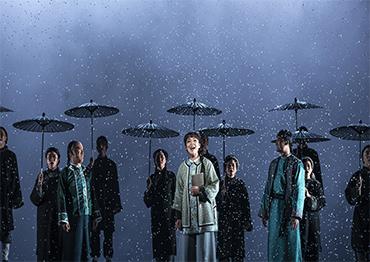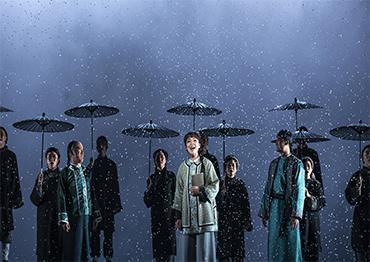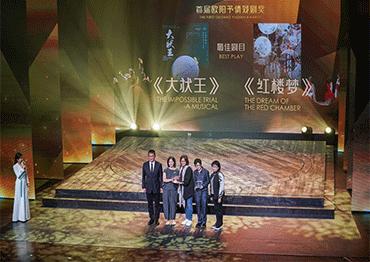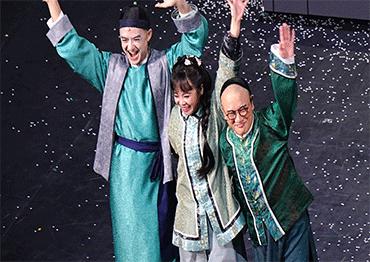When the deep dengwen drum echoes through the theater, it is more than the start of the show. It is an ancient call for justice.
In Qing China (1644-1911), dengwen drums were placed outside official buildings and hit by citizens seeking a magistrate’s attention to resolve grievances and redress wrongdoings.
This powerful opening sets the stage for The Impossible Trial, the award-winning Cantonese-language musical co-produced by the West Kowloon Cultural District Authority and Hong Kong Repertory Theater.
Set in southern China’s Guangdong Province during the Qing Dynasty, The Impossible Trial follows the journey of a once-corrupt and greedy lawyer who seeks redemption by pursuing justice for wronged people.
Premiering in Hong Kong in 2022, the show has won widespread acclaim across China. It swept the 31st Hong Kong Drama Awards, taking home 10 awards including Best Production, Best Director and Best Original Musical. It was honored at the 2024 Beijing Tianqiao Musical Annual Ceremony, earning five awards, and won six more at the China Musical Association Annual Ceremony.
Composed by Leon Ko, who is also the musical director, and directed by Fong Chun Kit, the show is a fusion of musical styles from East and West, from hip-hop to Buddhist chants.
This year, the musical embarked on its first Chinese mainland tour with 12 shows at Shanghai Culture Square from June 17 to 29, followed by 11 more at Beijing Tianqiao Performing Arts Center from July 11 to 20. Thanks to its growing word-of-mouth popularity, tickets sold out quickly. From August 14 to September 10, the show returned to the Xiqu Center for its third Hong Kong run.
The idea for The Impossible Trial came during a casual conversation between Ko and lyricist Chris Shum at a cafe in Shanghai in 2015.
Acclaimed as Hong Kong’s foremost musical “golden duo,” Ko and Shum have collaborated on several popular musicals over the past two decades, including The Good Person of Szechwan, Field of Dreams, Passage Beyond and Sing Out.
At the cafe, Shum proposed an idea: create a musical based on the folk hero Sung Sai Kit, a lawyer of the people who allegedly fought injustices in a corrupt Qing legal system.
Some historical records indicate that Sung was a real person who lived during the mid-to-late Ming Dynasty (1368-1644). While modern retellings are highly fictionalized, the core narrative lines up: Sung was a court scribe that lost his job because he refused to flatter corrupt officials, who then became known for helping people write petitions for free.
A well-known version is Sung Sai Kit (also known as The Judge Goes to Pieces), a classic Cantonese opera produced in the mid-1940s. It tells how Sung, a witty, silver-tongued attorney-turned-innkeeper during the Qing period, returns to the courtroom to correct an unjust ruling. The play was so influential that it inspired many adaptations, including Justice, My Foot!, a 1992 Hong Kong comedy film starring Stephen Chow. In those versions, the greedy and unscrupulous lawyer Fong Tong Geng appears as a foil to Sung Sai Kit, trying to win cases by any means necessary.
To produce the musical, Ko and Shum gathered a top-notch creative team from Hong Kong’s theater scene, including playwright Cheung Fei Fan, director Fong Chun Kit and lead cast members Lau Shau Ching, Jordan Cheng, Tunes Ting and Clinton Zhang.
The Impossible Trial follows Fong Tong Geng, who has caused 80 unjust verdicts with his cunning rhetoric. However, Fong’s life takes a turn when he is confronted by the ghost of his childhood friend, Ah Sai, who reveals himself to be Sung Sai Kit.
The ghost warns Fong that he is doomed to die for the injustices he has caused. Determined to change his fate, Fong, sets out on a journey of redemption with the ghost by his side, trying to right his wrongs in the courtroom.
“Chris Shum wanted to tell a redemption story, so we focused on Fong as our protagonist and made Sung a ghost,” Cheung Fei Fan, the show’s playwright, told the People’s Daily. “By using these two well-known characters, we paid tribute to tradition, but at the same time I wanted to tell a different story, like pouring new wine into an old bottle.”
Just as the title The Impossible Trial refers to a case that seems impossible to win, the production was facing its own challenges.
The show grapples with inherent contradictions in form and content. While rooted in modern Western theatrical traditions, the story is set in ancient China. In addition, the plot includes three major trials: two murder cases and one high-profile counterfeit medicine case involving royals. Depicting court trials in a musical context was a hurdle for its creators.
“Due to the inherent contradictions between form and content, it is indeed true that the subject matter of The Impossible Trial presents a significant challenge for musical theater,” writes Eos Cheng, a Hong Kong pianist and independent scholar of music and translation, in her 2023 essay on the work. “While original musicals set in ancient China are not uncommon in Hong Kong (such as 1894 Hong Kong Plague, Matteo Ricci and the English musical The Golden Lotus), the inclusion of extensive court scenes is a rarity,” Cheng wrote.
But she points out one of the show’s glaring achievements: it presents the trials entirely thorough songs and underscoring, blending the ancient Chinese court scenes with the modern musical genre in a “perfectly smooth and natural” way “as if the contradictions between the genre and the subject matter do not exist.”
The show opens with a 16-minute scene titled “Court!” about the case of an old woman accusing a rich man of beating her son to death. Throughout the scene, details about the plaintiff and the defendant, opening statements, testimonies and defenses are conveyed through songs and underscoring.
Another highlight is the mashup of music genres. Ko’s score covers over 30 styles, including rock, hip-hop, jazz, Broadway, folk, pop ballads, Cantonese opera, waltz and even nursery rhymes and Buddhist music.
By drawing from both musical and operatic traditions, the show resonates with a wider range of audiences, said Hu Suola, a Shanghai-based theater critic: “For instance, in the scene ‘The Debt,’ where the Grim Reaper enters, the music and stage setting may remind Broadway fans of King Herod in Jesus Christ Superstar.”
Cantonese opera fans will find familiar elements, too. “The use of a storyteller to narrate the story... and the actors’ vocal and performance styles draw inspiration from traditional operas,” Hu told NewsChina.
According to Hu, while many productions that claim to blend Western and Eastern styles only scratch the surface, The Impossible Trial achieves a rare balance.
“Its creators have combined the Western genre with Eastern art traditions in such seamless way that the arts of the East and West have blended into an organic whole. Audiences of all ages, regions and tastes will recognize elements in this show, but more importantly, these elements work together in harmonious unity,” Hu said.
In June and July, The Impossible Trial took the theater markets in Shanghai and Beijing by storm, attracting over 35,000 spectators for 23 sold-out shows. On Douban, China’s leading media review platform, the musical has earned a rare 9.5/10 rating. Many netizens have acclaimed the work as “the pride of Chinese musicals” and “the best Chinese musical to date.”
“This groundbreaking masterpiece has elevated original Chinese musicals to a new level. I would say it’s China’s Hamilton,” “Momo” commented on RedNote.
An Qing, a 28-year-old theatergoer from Beijing, saw two performances of The Impossible Trial at Beijing Tianqiao Performing Arts Center in mid-July. A passionate theater enthusiast, An attends more than 50 shows every year, including plays, musicals, dance dramas and operas.
“The Impossible Trial is really the best Chinese musical so far,” An told NewsChina. “It realistically explores the gray areas of human nature, the ambiguity of morality and the issue of justice. Most importantly, it presents the Eastern philosophy of life and death, which I rarely see in any musical,” An added.
As many audiences and critics have pointed out, one of the most touching moments in the show occurs when the ghost of Ah Sai decides to return to the netherworld and embrace his next life. In this scene, Ah Sai sings a quiet solo ballad, “The World in a Grain of Rice.”
The song begins with monks chanting The Heart Sutra in Sanskrit, accompanied by the resonating sound of bells, evoking a serene Buddhist temple atmosphere. Standing in front, the ghost of Ah Sai sings about letting go of his obsessions, bidding farewell to the world and embracing samsara – the cycle of birth, death and rebirth in Buddhism.
In the background, a funeral ceremony is held, with monks and family members scattering rice on the ground, a traditional practice in Cantonese culture meant to comfort the soul of the deceased on its journey to the afterlife.
“I burst into tears when I heard the song at the theater,” An said. “I always thought musicals were a genre that couldn’t be as deep and profound as serious plays... But The Impossible Trial has changed my view. A musical can be very profound and thought-provoking.”
In an interview with the Wenhui Daily, playwright Cheung Fei Fan said, “Even though people often say that a musical’s story should be simple, when I wrote The Impossible Trial, I wanted to challenge that stereotype. I aimed to show that a musical can be filled with profound humanity. We spent eight years refining this story and improving the show’s artistic quality, hoping that audiences would gain more insights from it beyond just entertainment.”
“I think that’s why many people watch the show multiple times,” Cheng added. “The first time, they may enjoy the music. The second time, they may be drawn to the story. And the third time, they might reflect on their own lives.”

 Old Version
Old Version


